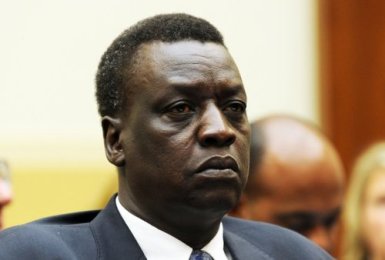S. Sudan hopeful of AU endorsement of mediation proposal on Abyei
October 22, 2012 (JUBA/KHARTOUM) – South Sudan on Monday expressed “strong optimism” about the possibility of the African Union Peace and Security Council (AUPSC) coming together to “unanimously” endorse a peace proposal aiming at addressing a long standing dispute over the border region of Abyei.

Deng spoke to Sudan Tribune after his arrival to the Ethiopia capital, Addis Ababa, from South Africa where he and accompanying government officials held bilateral discussions with officials from South Africa’s government and leadership of the country’s ruling party on Sunday.
The co-chair of Abyei Joint Oversight Committee (AJOC) will participate in a ministerial meeting of the African Union Peace and Security Council where the issue of Abyei will be discussed and a possible resolution is expected to be endorsed on Wednesday 24 October before being refered to the UN Security Council.
At the height of conflict between South Sudan and her neighbouring Sudan in April, AUPSC unanimously issued a strongly-worded communiqué, demanding the two sides to pull out their troops from Abyei and other disputed areas notably Heglig.
The prime objective of the communiqué was to ease hostilities from flash point areas and urge the parties to the conflict to immediately resume negotiations without preconditions. These demands were later adopted by the security council of the UN and passed a resolution number 2046 demanding also the two countries to pull their armed forces out of contested areas and to resume completed negotiations on all outstanding issues with three months.
In the event that the two sides failed to reach an agreement, the African Union High Implementation Panel (AUHIP) would make a recommendation to be approved by the African Union Peace and Security Council as a final and binding decision on both sides.
Conscious of the threat to their economies, both Sudan and South Sudan decided to resume discussions in Addis Ababa in June, under facilitation by the AUHIP, resulting in the signing of nine agreements in September.
The agreements, which were received with mixed reactions particularly by border communities in the South, were ratified by the two houses, paving the way for the resumption of negotiations the remaining outside issues. While deal allows the South to resume oil production and export it to the international markets through Sudan, the two sides could not agree the mediation’s proposal on Abyei and the status of other contested areas.
South Sudan President Salva Kiir and his negotiating team accepted the proposal but Sudanese President Bashir and his negotiating team rejected it. Sudan expressed its support to a previous proposition the mediation had made in November 2010 calling to partitioning the region between the two countries but Juba rejected it.
Deng said the government of South Sudan and its negotiating team accepted the mediator’s proposal because it derives its basis from the 2005 peace accord, which provides the people of Abyei, through a specific protocol, the right to decide their fate at a referendum and come in line with the decision of the Permanent Court of Arbitration on the area.
The South Sudanese official, explained that the new nation expects the African Union to not only to endorse the proposal but to come up with measures to ensure the parties accept and immediately implement the outcome of the proposal.
“Of course there are concerns about commitment of the (Sudanese) government to honouring agreements but if Khartoum tries this time to reject again the endorsed proposal, as it done in the past, the AU should review the membership of Sudan in AU and its protection from the ICC [International Criminal Court]. The AU should explore other economic and political sanctions that should isolate Sudan,” he said.
“The government of the Republic of South Sudan as a member of the AU should review its bilateral relations with Sudan including the recently signed Cooperation Agreement. The South should review its payment of $3.028 billion to Sudan as Transition Financial Assistance, joint campaign for debt relief, mobilization of international community to assist Sudan and lifting of economic sanctions,” Deng stressed.
The official further stated members of the UN Security Council are expected to unanimously endorse the AU endorsed proposal on the final status of Abyei.
“But if Bashir attempts to reject it the UN endorsed proposal on Abyei, the UN Security Council should equally take more severe sanctions on Sudan, particularly economic and political sanctions. The international community should stand together to apprehend Bashir and hand him over to ICC. The UN Security Council in collaboration with AU to explore a possibility of ensuring the conduct of Abyei Referendum in 2013 even without the consent of Sudan”, he explained.
Recently US Ambassador to the United Nations, Susan Rice said Resolution 2046 was adopted thanks to the united position of the Security Council.
Khartoum, which is aware of Rice’s support to the South Sudanese position over Abyei has sought to convince Moscow to support the partition of Abyei saying it can bring a lasting peace between the two communities of the disputed area.
In Khartoum, following a meeting with Vice-President Al-Haj Adam Youssef with the co-chair of the Abyei Joint Oversight Committee (AJOC) Al-Khair Al-Fahim, told reporters in Khartoum that they support the position of President Omer Al-Bashir which rejects the AU proposal on Abyei referendum.
Al-Fahim who was accompanied by a delegation of Messeyria tribal leaders launched a call for peaceful coexistence between the nomads and the Ngok Dinka, but he did not speak about the message they delivered to the Sudanese presidency.
(ST)
